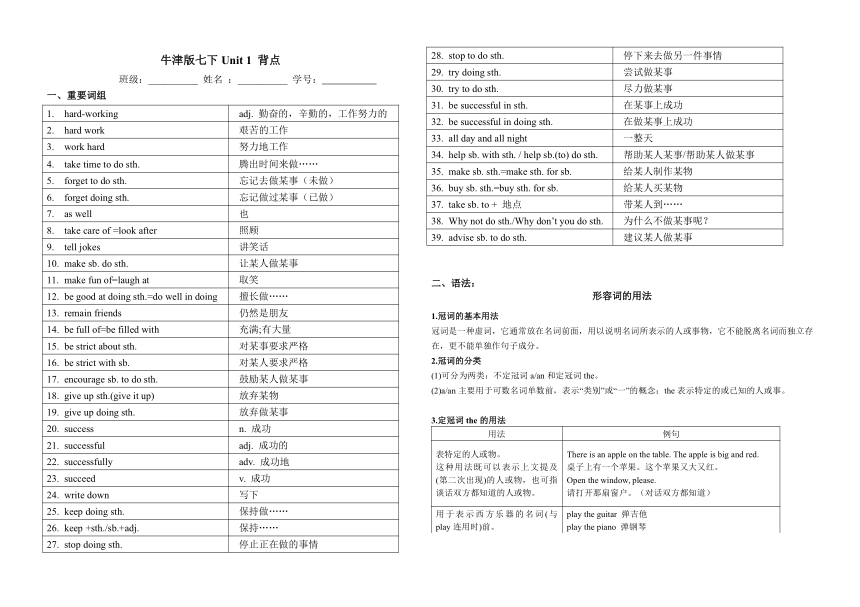
牛津版七下Unit 1 背点 班级:_____ 姓名 :_____ 学号: 一、重要词组 hard-working adj. 勤奋的,辛勤的,工作努力的 hard work 艰苦的工作 work hard 努力地工作 take time to do sth. 腾出时间来做…… forget to do sth. 忘记去做某事(未做) forget doing sth. 忘记做过某事(已做) as well 也 take care of =look after 照顾 tell jokes 讲笑话 make sb. do sth. 让某人做某事 make fun of=laugh at 取笑 be good at doing sth.=do well in doing 擅长做…… remain friends 仍然是朋友 be full of=be filled with 充满;有大量 be strict about sth. 对某事要求严格 be strict with sb. 对某人要求严格 encourage sb. to do sth. 鼓励某人做某事 give up sth.(give it up) 放弃某物 give up doing sth. 放弃做某事 success n. 成功 successful adj. 成功的 successfully adv. 成功地 succeed v. 成功 write down 写下 keep doing sth. 保持做…… keep +sth./sb.+adj. 保持…… stop doing sth. 停止正在做的事情 stop to do sth. 停下来去做另一件事情 try doing sth. 尝试做某事 try to do sth. 尽力做某事 be successful in sth. 在某事上成功 be successful in doing sth. 在做某事上成功 all day and all night 一整天 help sb. with sth. / help sb.(to) do sth. 帮助某人某事/帮助某人做某事 make sb. sth.=make sth. for sb. 给某人制作某物 buy sb. sth.=buy sth. for sb. 给某人买某物 take sb. to + 地点 带某人到…… Why not do sth./Why don’t you do sth. 为什么不做某事呢? advise sb. to do sth. 建议某人做某事 二、语法: 形容词的用法 1.冠词的基本用法 冠词是一种虚词,它通常放在名词前面,用以说明名词所表示的人或事物,它不能脱离名词而独立存在,更不能单独作句子成分。 2.冠词的分类 (1)可分为两类:不定冠词a/an和定冠词the。 (2)a/an主要用于可数名词单数前,表示“类别”或“一”的概念;the表示特定的或已知的人或事。 3.定冠词the的用法 用法 例句 表特定的人或物。 这种用法既可以表示上文提及(第二次出现)的人或物,也可指谈话双方都知道的人或物。 There is an apple on the table. The apple is big and red. 桌子上有一个苹果。这个苹果又大又红。 Open the window, please. 请打开那扇窗户。(对话双方都知道) 用于表示西方乐器的名词(与play连用时)前。 play the guitar 弹吉他 play the piano 弹钢琴 the与介词短语连用:名词后如果有介词短语加以限制,则具有特指意义,名词前须用定冠词。 1. The girl under the tree is my sister. 在树下的那个女孩是我妹妹/姐姐。 2. The book on the table isn’t mine. 桌上的那本书不是我的。 表示地球上、宇宙中独一无二的事物(如各种天体及江、湖、河、海、山川、群岛等)。 the Sun 太阳 the Earth 地球 the Moon 月亮 the Great Wall 长城 用于姓氏复数前,表示一家人或夫妇两人。 the Smiths史密斯一家人/史密斯夫妇 the Wangs王先生一家/王氏夫妇 用于序数词或形容词最高级前。 He is the first to speak in the competition. 他是比赛中第一个发言的。 Guangzhou is one of the largest cities in China. 广州是中国最大的城市之一。 用于某些形容词前,表示一类人或事物。 the deaf 聋子 the rich 富人 the disabled 残疾人 用于固定搭配中。 in the morning/afternoon/evening 在早上/下午/晚上 at the moment 此刻 at the same time 同时 in the front of 在……的前部 by the way 顺便说一下 at the beginning/end of 在……的开端/末尾 三、重点句子 I will never forget the taste, and the smell as well. 我永远不 ... ...
~~ 您好,已阅读到文档的结尾了 ~~